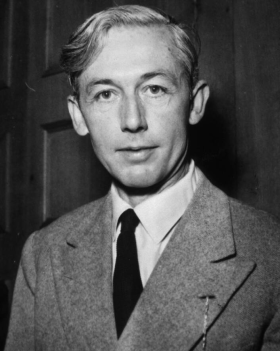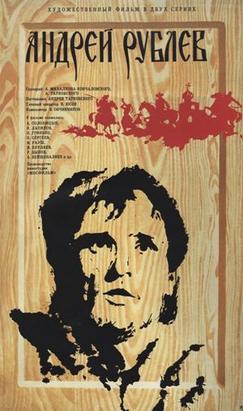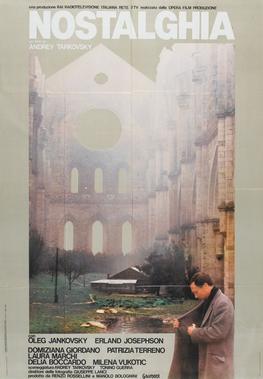
Andrei Arsenyevich Tarkovsky was a Soviet film director and screenwriter. He has been widely considered one of the best directors in cinema history. His films explore spiritual and metaphysical themes and are known for their slow pacing and long takes, dreamlike visual imagery and preoccupation with nature and memory.

The Mellotron is an electro-mechanical musical instrument developed in Birmingham, England, in 1963. It is played by pressing its keys, each of which causes a length of magnetic tape to contact a capstan, which pulls it across a playback head. As the key is released, the tape is retracted by a spring to its initial position. Different portions of the tape can be played to access different sounds.

Robert Bresson was a French film director. Known for his ascetic approach, Bresson made a notable contribution to the art of cinema; his non-professional actors, ellipses, and sparse use of scoring have led his works to be regarded as preeminent examples of minimalist film. Much of his work is known for being tragic in story and nature.

Stalker is a 1979 Soviet science fiction film directed by Andrei Tarkovsky with a screenplay written by Arkady and Boris Strugatsky, loosely based on their 1972 novel Roadside Picnic. The film tells the story of an expedition led by a figure known as the "Stalker", who guides his two clients—a melancholic writer and a professor —through a hazardous wasteland to a mysterious restricted site known simply as the "Zone", where there supposedly exists a room which grants a person's innermost desires. The film combines elements of science fiction and fantasy with dramatic philosophical, and psychological themes.
Lyn Hejinian was an American poet, essayist, translator, and publisher. She is often associated with the Language poets and is known for her landmark work My Life, as well as her book of essays, The Language of Inquiry.

The Sacrifice is a 1986 drama film written and directed by Andrei Tarkovsky. Starring Erland Josephson, the film was produced by the Swedish Film Institute. Many of the crew were alumni of Ingmar Bergman's films, including world-renowned cinematographer Sven Nykvist.

Sepia is a reddish-brown color, named after the rich brown pigment derived from the ink sac of the common cuttlefish Sepia. The word sepia is the Latinized form of the Greek σηπία, sēpía, cuttlefish.

Andrei Rublev is a 1966 Soviet epic biographical historical drama film directed by Andrei Tarkovsky who co-wrote it with Andrei Konchalovsky. The film was re-edited from the 1966 film titled The Passion According to Andrei by Tarkovsky which was censored during the first decade of the Brezhnev era in the Soviet Union. The film is loosely based on the life of Andrei Rublev, a 15th-century Russian icon painter. The film features Anatoly Solonitsyn, Nikolai Grinko, Ivan Lapikov, Nikolai Sergeyev, Nikolai Burlyayev and Tarkovsky's wife Irma Raush. Savva Yamshchikov, a famous Russian restorer and art historian, was a scientific consultant of the film.

Nostalghia is a 1983 drama film directed by Andrei Tarkovsky and starring Oleg Yankovsky, Domiziana Giordano and Erland Josephson. Tarkovsky co-wrote the screenplay with Tonino Guerra.

Mirror is a 1975 Soviet biographical drama film directed by Andrei Tarkovsky. It is loosely autobiographical, unconventionally structured, and incorporates poems composed and read by the director's father, Arseny Tarkovsky. The film features Margarita Terekhova, Ignat Daniltsev, Alla Demidova, Anatoly Solonitsyn, Tarkovsky's wife Larisa Tarkovskaya and his mother Maria Vishnyakova. Innokenty Smoktunovsky provides voiceover and Eduard Artemyev the incidental music and sound effects.

The Tired Sounds of Stars of the Lid is the sixth studio album by ambient drone music group Stars of the Lid. It was released in late 2001 on the Kranky label, on two CDs and three LPs. The album features long minimal, droning compositions created from heavily treated guitar, horn, flute, piano, and other classical instruments.

Sculpting in Time is a book by Russian filmmaker Andrei Tarkovsky about art and cinema in general, and his own films in particular. It was originally published in 1985 in German shortly before the author's death, and published in English in 1987, translated by Kitty Hunter-Blair. The title refers to Tarkovsky's own name for his style of filmmaking.
In film theory, the term oneiric refers to the depiction of dream-like states or to the use of the metaphor of a dream or the dream-state in the analysis of a film. The term comes from the Greek Óneiros, the personification of dreams.

Anatoly Kudryavitsky is a Russian-Irish novelist, poet, editor and literary translator.

Andrei Tarkovsky (1932–1986) was a Soviet filmmaker who is widely regarded as one of the greatest directors of all time. His films are considered Romanticist and are often described as "slow cinema", with the average shot-length in his final three films being over a minute. In his thirty-year career, Tarkovsky directed several student films and seven feature films, co-directed a documentary, and wrote numerous screenplays. He also directed a stage play and wrote a book.

Solaris is a 1972 Soviet science fiction film based on Stanisław Lem's 1961 novel of the same title. The film was co-written and directed by Andrei Tarkovsky, and stars Donatas Banionis and Natalya Bondarchuk. The electronic music score was performed by Eduard Artemyev and features a composition by J.S. Bach as its main theme. The plot centers on a space station orbiting the fictional planet Solaris, where a scientific mission has stalled because the skeleton crew of three scientists have fallen into emotional crises. Psychologist Kris Kelvin (Banionis) travels to the station to evaluate the situation, only to encounter the same mysterious phenomena as the others.
This is a bibliography of notable books on Hindi cinema.
A bibliography of reference material associated with the James Bond films, novels and genre.
Arthouse science fiction is a combination of art and science fiction cinema.